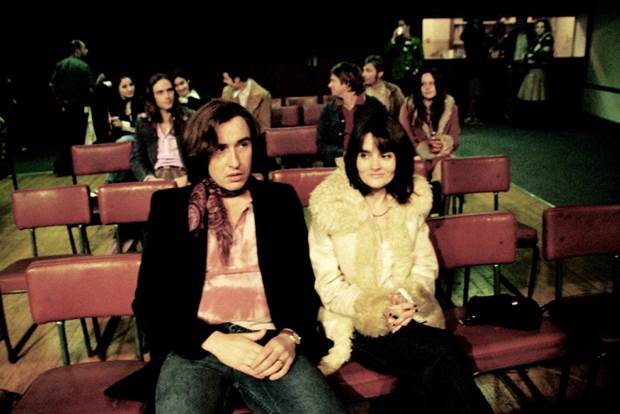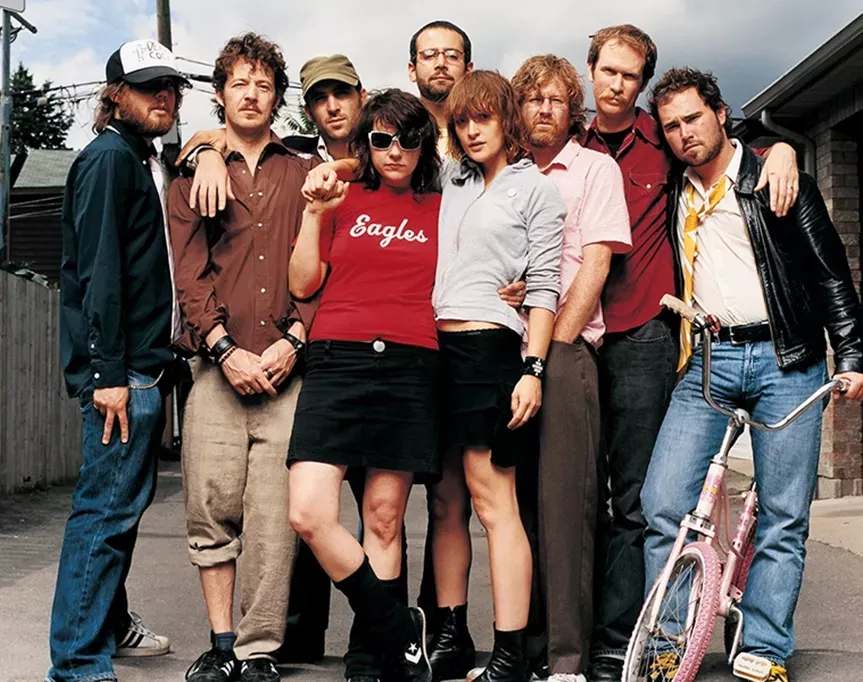five films to help you watch live music from home
Sometimes you wish you could lie on your couch and have a band come play music in your living room, while you work up the energy to put on a load of washing. That scenario is totally possible.
I recently went to a big, shiny live music concert and while I wasn't the coolest person there or anything, I still had an amazing time. I bopped in my seat like some kind of ecstatic child and sang along at the top of my lungs. It was so great!
Experiencing live music is really one of the best and most amazing things you can do with your time. It is up there with eating chips, sleeping in or coming across a room full of puppies. There are some downsides, though: 1. Live music venues can get really, really hot; 2. Live music venues are usually full of other people who are screaming, pushing and being tall; 3. Sometimes live music is too expensive/not playing where you are. Or your favourite band doesn't tour, because they are from the olden days/have given up on that all together.
Sometimes, you also just don't FEEL up to seeing live music. Sometimes (OK, all the time) you just wish that you could lie on your couch and have the band come to you and play music in your living room, while you work up the energy to put on a load of washing.
Never fear, my friends. This scenario is totally possible. This is where these movies come in:
Control
Lead singer Ian Curtis and his childhood friend Peter Hook formed Joy Division in Manchester in 1976. The band became central to the 1970s post-punk movement, and by 1980 their growing European success led to plans for a US tour. On the eve of this tour, the 23-year-old Curtis hanged himself.
The biopic Control is the directorial debut of photographer Anton Corbijn, whose black-and-white images of Joy Division became iconic of the band and the man. Control covers the formation and rise of Joy Divison alongside the disintegration of Curtis's marriage as he spirals further into depression while carrying on an affair with Belgian journalist Annike Honoré.
More than anything, though, Control shows us Curtis's truly unique and irreplaceable gift for music, which clashed terribly with his private disconnection from himself and his relationships with others. Control is an incredible depiction of human genius that seems, for a reason unfathomable to the rest of us, impossible to bear.
24-Hour Party People
Joy Division didn't come out of nowhere, you know. During the '70s and '80s, Manchester was home to one of the most vibrant music scenes in Europe, and 24-Hour Party People is the very strange story of a man at the centre of that scene: journalist, television personality, music promoter, band manager, eventual cocaine addict and wannabe all-round impresario, Tony Wilson. The casting of Steve Coogan (who is amazing and brilliant) as Wilson captures the movie's strange twisting of fact and fiction: Coogan had already used Wilson as the basis for his own alter ego, the utterly clueless and self-important talk show host Alan Partridge.
I first saw 24-Hour Party People when it came out in 2002, and it was something like the beginning of a musical education of sorts. It wasn't just a matter of being exposed to a whole bunch of bands I'd maybe only heard of, but of also being taken on a personal guided tour of a frenzied creative decade in a city on the boil. Winterbottom's eclectic mash of historical recreation, mock documentary, you-are-really-there, no-frills realism, and fanciful hallucination drenches you in the exhilarating and hilarious fever of a commitment to music wildly untethered to the harsh realities of commercial markets or even basic respect for anybody's personal feelings or safety. Filmmaking like this is pretty darn rare and I would say that with some exceptions, music like what we see in 24-Hour Party People is even rarer still.
Life is But a Dream
I will never get to experience what it is like to be Beyoncé (this is one of my life's great regrets – please put it on my tombstone), but this documentary, directed by Her Majesty/Mrs Carter/Sasha Fierce/Beyoncé Giselle Knowles herself, provides a pretty good summary. The project started approximately one thousand years ago, in the year 2005, when Beyoncé hired a "visual director" to document her every waking hour. This meant being followed around for up to 16 hours a day and have almost every detail of her life catalogued into a massive digital database – something B.K. calls her "crazy archive". The end result – or, at least, the first end result that we've seen – is Life is But a Dream, a sort of autobiographical documentary, where Bey muses on the meaning and difficulty of being ambitious, powerful and famous, while showing us a very carefully stage-managed peek into her life off stage.
To be honest, Life is But a Dream isn't a great behind-the-scenes documentary about stardom or fame – it's too guarded and polished for that – but it is a fascinating insight into how much the most important and compelling popular musician of the twenty-first century wants to tell us about herself and what parts of her life she thinks are important. The end result of decades of fierce ambition, determination and success is a kind of understandable cautiousness, which seems at odds with her stage presence, her attitude and her commands to "Bow down, bitches." This only makes Life is But a Dream all the more interesting – by the end, you might find yourself silently mouthing, "WHO ARE YOU, BEYONCÉ?" as the credits role and you get back to your life without Beyoncé in it.
Standing in the Shadows of Motown
Standing in the Shadows of Motown starts with an old man named Joe Hunter sitting on the cold stoop of his Detroit home remembering when he was a member of a band. Joe played keyboard in a group called the Funk Brothers, who wrote and played the music on almost all of the songs released by the Motown record label. Between them, Funk Brothers are responsible for more number one hits than The Beatles, The Rolling Stones, The Beach Boys, and Elvis combined. Intercut with the scenes of Joe sitting on his front steps is footage of him playing piano in the lobby of a hotel in Troy, Michigan, a tip jar perched on its lid.
The movie gives Joe and his bandmates the honour they might have otherwise been denied. The heart and soul of the film, where it is at its best, is in its expressions of gratitude for their music – when it puts the real talent and genius of these men and women on display. This reaches its greatest height when, during the beginning of the reunion concert that brings the old guard of the Funk Brothers together, each member of the group is – section by section – introduced individually. Tragically, some are present only in the form of framed photographs placed on the chairs they would have sat in were they still alive.
One of these missing figures is bass player James Jamerson, for whom is reserved the last, most rapturous and celebrated introduction of all. The MC's voice soars, as if preaching, and declares Jamerson "the greatest bass player of all time!" A section focused on Jamerson tells us how, as a young boy in South Carolina, he would break into his schoolroom before dawn, light a fire with his friends, and they would play piano together until classes began. These memories are narrated while we are shown images of the very school buildings where Jamerson tended to his passion and talent. They lie in ruins, overgrown by grasses and weeds.
Queen: Live at Wembley Stadium
One of the most prized experiences we search for when we attend live music is something like intimacy. We want to feel close not so much to the people around us, although that can be a great part of the experience, but above all to the musicians, to the performers up there on that stage who are playing just for us.
For this reason, we should all probably hate stadium shows. What chance do we have for a sense of that intimacy when we're stuck, along with thousands of other people, down the back of an endless stadium designed for hosting huge-scale football matches? It seems like a pretty crass and cynical attempt to cash-in by cramming-in.
But the wonder of Queen: Live at Wembley Stadium is that the scale of the crowd doesn't overpower Freddie Mercury's performance but seems completely necessary to it. In a smaller space, one that might promise closer proximity to Mercury, his theatrics might seem a bit excessive, over-the-top, as if mis-targeted, lacking something like their proper proportions. As the first chords of "One Vision" blast the set open, and Mercury prowls and struts and flashes his grin at the crowd, his gestures aren't weakened by the size of the stadium and the people around him. Instead it seems only fitting that a man with this voice and force – "One man / one goal / one vision" – should stand before more than 200,000 people.















.jpg&q=80&w=316&c=1&s=1)













.jpg&q=80&w=316&c=1&s=1)










